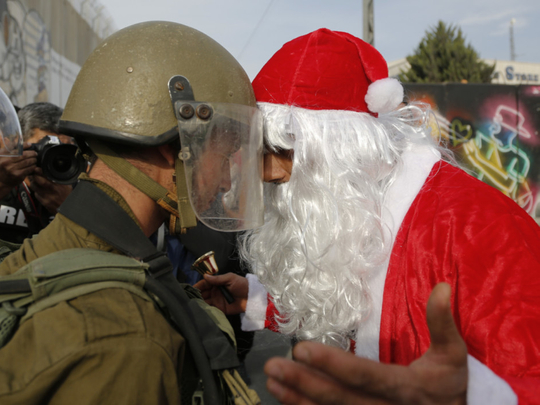
Bethlehem, West Bank: A Christmas tree inside the doorway beckoned travelers to the Jacir Palace Hotel, a luxury inn in the West Bank city of Bethlehem.
The Jacir Palace sits along a stretch of road that has become a main flash point for protests, only yards away from Israel’s 26-foot-tall concrete barrier separating Bethlehem from Occupied Jerusalem.
Since President Donald Trump’s recognition this month of Occupied Jerusalem as Israel’s capital, Israeli soldiers have cracked down on Palestinians resistence protests outside the hotel’s gates.
As the clashes have simmered on Bethlehem, like the rest of the Palestinian territories, seemed suspended in a kind of limbo.
With residents neither basking in seasonal cheer nor raging in the throes of a new intifada, the popular mood in the city was more one of hopeless resignation.
Many Palestinians in Bethlehem described their own leadership as feckless and confrontation with the Israelis as futile.
“It’s been sold,” Mohammad Abu Sabaiyya, 41, said of Occupied Jerusalem as he sat idly in his empty car repair shop.
“Those who are not going out into the streets know it was all already agreed to with our government.”
Abu Sabaiyya’s cynicism echoed a widespread sentiment as he stared out at the separation wall adorned with graffiti, including a recent addition: an image of Trump wearing a black Jewish skullcap.
Yet, despite the dire predictions of major turmoil, and the best efforts of both Fatah and Hamas to mobilise the masses, so far there has been no large-scale, spontaneous outburst of violence in the wake of the president’s declaration.
A few thousand protesters have turned out at familiar friction points in the West Bank or along the Gaza border on the designated “Days of Rage” called for by the political factions.
“It’s not that people don’t want to stand up for their rights,” said Samar Salah, 25, a Palestinian student from a nearby village who had come to Bethlehem with her friends to see the Christmas decorations.
“But there are never any results.”
Many Palestinians now view the confrontations with Israeli soldiers as pointless since they consider the Jerusalem declaration unlikely to be reversed. Those lucky enough to have decent jobs do not want to jeopardize their livelihoods. Others struggling to make ends meet seem to have more immediate concerns than throwing stones at Israeli soldiers.
Ibrahim Skakiyeh, 28, a father of two from Ramallah, was out hawking red Santa hats and selfie sticks in Manger Square, near the Church of the Nativity, venerated as the traditional birthplace of Jesus.
“Trump’s announcement ruined everything,” Skakiyeh said, adding that he still had to purchase milk and diapers on his way home. “All on loan,” he added.
The deputy leader of Fatah, Mahmoud Aloul, recently declared the Oslo peace accords with Israel to be over and said that all forms of resistance were legitimate.
In a recent survey, 70 per cent of Palestinians said that President Mahmoud Abbas of the Palestinian Authority should resign.
In a Christmas message Friday, Abbas said that Trump’s decision had “encouraged the illegal disconnection between the holy cities of Bethlehem and Jerusalem.”
Analysts have still not discounted the possibility of a larger flare-up. Since Trump’s declaration, at least 11 Palestinians have been killed by Israeli fire.
The sentiment in Gaza is not much different.
“I only throw stones. I have no gun in my hand,” Mohammad Abu Salah, 24 said, during a clash with Israeli soldiers at the Erez crossing in the northern Gaza Strip, while ducking the clouds of tear gas.












